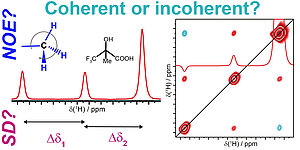Fast magic-angle spinning (MAS) NMR experiments open the way for proton-detected NMR studies and have been explored in recent years for a wide range of materials, including biomolecules and pharmaceuticals.
Recently, the appearance of negative cross-peaks in 2D 1H-1H spin-diffusion (SD) based spectra has been reported and explained by higher-order SD effects, in which the chemical shifts of the quadruples of nuclei involved must compensate for each other. In a new publication, a team led by Prof. Wiegand, Max Planck research group leader at MPI CEC, reports negative cross peaks in SD-based spectra observed in a variety of small organic molecules bearing with methyl groups.
By combining experimental observations with numerical simulations, the team led by Prof. Thomas Wiegand was able to disentangle coherent and incoherent effects contributing to such negative peaks. A deeper understanding of the origin of negative cross-peaks in proton-detected solid-state NMR spectra recorded at fast magic-angle spinning (MAS) opens further avenues for simplified resonance assignment, for instance in proteins and organic systems. The goal is to investigate whether similar effects can be observed in fast 19F MAS experiments.
The article was extremely well received, and has been selected by PCCP Editors as a 2023 HOT PCCP article. The collection, now including the publication, can be found here.
Original Publication:
Ettore Bartalucci, Dominique J. Luder, Nicole Terefenko, Alexander A. Malär, Carsten Bolm, Matthias Ernst and Thomas Wiegand (2023) The effect of methyl group rotation on 1H-1H solid-state NMR spin-diffusion spectra, Phys. Chem. Chem. Phys., 2023, 25, 19501-19511 DOI: 10.1039/D3CP02323K
https://pubs.rsc.org/en/content/articlelanding/2023/cp/d3cp02323k

